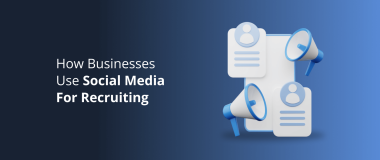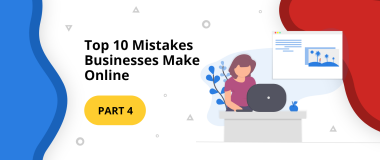Websites gave birth to e-commerce and with time has turned it into an industry worth billions of dollars. Businesses realize the importance of having a solid website and are eager to invest more into it. Some might question this notion suggesting social media is the next investment playground but they are only half correct.
Social media, without a doubt, is a mechanism for growth and marketing for retail businesses. However, a website serves as the base for retail sales, especially for enterprises.
Related: 3 Traits to Look For in a CMS Fit For Enterprise
Why Is a Website Still Relevant?
A website’s importance springs from the fact that the actual conversions and sales take place on the website. In contrast to a website, social media and mobile serve as a marketing channel. Surely they play a great part in leading the visitor to the conversion page, but you need to have a web page to make the sale.
Having a website also plays well for the customers on a psychological level. A business with a beautifully designed and secure website is likely to gain more trust from a customer than a business with a low-quality website or no website at all. The key thing to remember here is that websites are synonymous with retail purchasing.
Retailers realize this truth and are still focused on investing in their website. There is a great potential in online retailing as the industry has only seen growth in the last decade. According to statistics, 71% of shoppers believe that they can find a better deal online than in stores.
The rise of social media and mobile can cause distractions from areas of business that remain vital and act as the backbone of your online presence. Social platforms can be used to drive more traffic and attract new customers, leading them to make the purchase on a retailer’s website.
If both the new platforms for marketing and the core conversion focal point i.e. your website are integrated in the right way, your business is bound to succeed as sales are likely to rise.
Affiliate Marketing
For those who are not familiar with affiliate marketing, it is a commission based marketing where you promote somebody else’s product and usually get a cut in the profit. This marketing tactic is seeing a steady rise in investment by online retailers as it helps increase sales and brings in new customers. It is cost effective and has a high return on investment. Amazon is the top choice for affiliate marketing for most online retailers. It is followed by eBay, Shopkick, and Wrapp.
It is one of those things where you cannot go wrong with because it is a pay on results marketing. Not only do you make conversions, you get massive exposure. Imagine how many people visit Amazon each day and even a fraction of those visitors is enough to take a small retailer to earning top money. Owing to the many benefits of affiliate marketing, retailers are investing to identify possible affiliate networks that work well for their product and brand image.
Again, affiliate marketing is based largely on websites and gives a strong case for investing in it. Here you invest in someone else’s website but essentially a website. Even with affiliate programs, the final conversion takes place on your own website so having a good one is just as important as investing in marketing schemes. Your website should be able to gauge the same level of trust and engagement as your affiliates. If your website is not good enough, the final conversion may be hindered.
How to Invest in Your Website?
There are plenty of ways you can invest in your website and make it stand out. The design of your website is the ultimate key to success. It, on its own, can serve as a huge conversion tool and represent your brand. Make sure your website is simple yet interactive enough to keep the visitor. Just because you are a retail business does not mean your website has to be a plain shopping cart. You have to invest in getting it designed smartly.
Security is another important factor in an e-commerce business. Never compromise on the security layer of your website and keep on investing to keep it secure. Hackers out there are getting smarter day by day, and your website needs to tackle them. Nothing is worse than having a hacker steal your customer’s credit card information or other confidential info.
Your website is a marketing playground in itself. Today’s generation is focused on product experience. The website has to provide people with a shopping experience, similar to what happens at a store. However, the experience does not have to be complicated.
Do Not Forget Social Media
While focusing on your website is a good thing, social media and mobile deserve your equal attention. Mobile e-commerce is estimated to be worth $3.2 trillion according to Selz. Social media and mobile should be your top priority when it comes to marketing investment. Since the competition is stiff, retailers use social media to become more visible.
While Facebook is the number one platform for most retailers, Pinterest is also seeing growing interest and investment. There is no surprise there as Pinterest’s users are mainly females and it is all about pinning pictures and sharing it with people. It serves as a great marketing platform for clothing, shoes and the cosmetic businesses.
When we speak about social media, video is the next big tool for marketing. Retailers need to invest in video marketing and use Facebook and Twitter to get those videos viewers. The transition from social and mobile to your website has to be smooth and straightforward. That is the only way to make sure that you achieve your desired conversion.
One other important thing to note here is to maintain your identity, even on social media. Your posts and ads should have the same brand image as your website. The customer should be able to recognize you among the myriads of ads and posts on social media.
Conclusion
For a retailer, it can be confusing at times as to where to direct your investment as the number of channels for marketing keeps growing. However, it is clear that a website still is a priority for e-commerce alongside social and mobile media. The balance of these platforms is crucial to the success of any online business.
While Facebook may be the starting point of a customer’s journey, a website is a culminating point where you will make the most revenue. As said before, they are all different stops on the experience of the buyer and you have to invest in the whole experience.
Besides using Facebook, Twitter and the likes of it, your business can use affiliates to grow clientele and increase sales. It is a smart investment with minimal risk and many retailers are already doing that. Whatever methods you use to drive traffic, a website the base of your business, and like everything else in this world; if your base is not strong your whole structure is weak.




